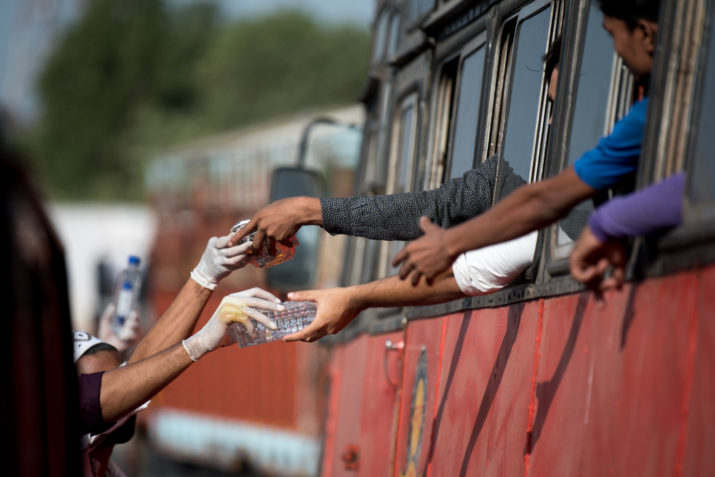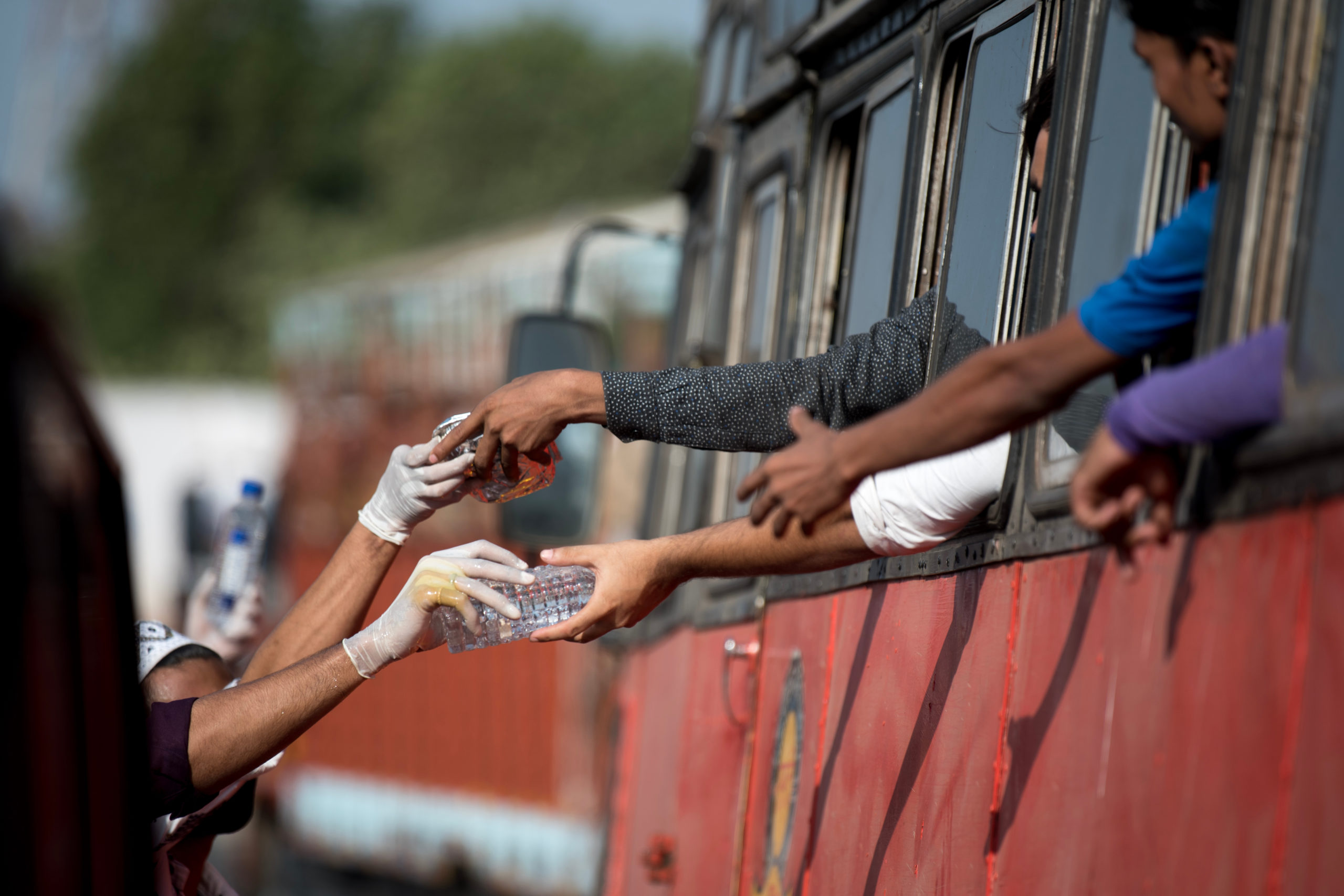

This is part of our special feature, Networks of Solidarity During Crisis.
This is part of our Campus Spotlight on Bennington College.
Over the past few months, with the support of the Mellon-funded Consortium on Forced Migration, Displacement, and Education, a small group of students at Bennington College has been researching, in real-time, how the unfolding crisis of COVID-19 is impacting immigration politics.
Since the onset of the virus, scholars and engaged publics have heatedly debated how the emergency measures adopted by governments across the globe—“shelter in place” orders, mask requirements, expanded welfare provisions, mandates for companies to produce more PPE, etc. —will impact the rights of citizenship and the machinations of democracy. Not surprisingly, these discussions often revolve around the impacts of state intervention and emergency powers on the demos writ large. We wondered: what about the impacts of corona-politics on a populace whose mobility is constantly surveilled, whose citizenship rights are already curtailed, and whose health has long been sacrificed for the good of the nation?
The three interventions that follow, by Soumya Rachel Shailendra (Class of ‘21), Sitashma Parajuli (Class of ‘21), and Ioanna Katsara (Class of ‘20), offer snapshots of how COVID-19 has intersected with and amplified anti-migrant politics in three countries: India, Nepal, and Greece. The students’ findings indicate that responses to the crisis may well have deleterious impacts on democracy, but ones that—far from challenging extant norms and practices of liberal citizenship—have thus far served to re-entrench the exclusionary mantle on which existing democratic regimes have been consecrated.
—An introduction by John Hultgren
COVID-19 and the future of democracy in India
Soumya Rachel Shailendra
The faces of migrant workers dotting the streets of major Indian cities in the aftermath of the national lockdown has defined Prime Minister Narendra Modi’s response to COVID-19. The Indian lockdown, which was originally touted as a twenty-four-hour janta curfew (citizen’s curfew), was implemented overnight on March 25, leaving 23.52 percent of the country’s population unemployed by May.[1] The militarization of the response to the pandemic under the colonial Epidemic Disease Act of 1847 has jeopardized the future of federalism in India.[2] COVID-19 has revealed the incapacity of an authoritarian regime like Modi’s in effectively containing the virus, and the faces of wage workers, helplessly fleeing the cities, symbolizes the government’s apathy towards protecting the rights of migrants—a mobile demographic that challenges the rigid border politics of an increasingly fascist state. As of June 3, the SaveLife Foundation has reported a total of 118 migrant deaths due to road accidents; several others have died because of starvation, unemployment, and suicide.
Modi displayed his disregard for refugees by implementing the Citizenship Amendment Act (CAA) and National Register of Citizens (NRC) in December 2019, which excluded Muslim minorities from neighbouring countries from attaining fast-track citizenship. The pandemic has given the state another fertile ground to communalize the conversation around migration by selectively targeting Muslim immigrant localities for breaking social distancing norms. Muslim migrant workers from West Bengal and Bihar in Jaipur’s Painters Colony, Nahri ka Naka, were met with baton charging each time they conglomerated on the street to demand free dry ration packets.
But the government has prioritized the needs of elite Indian expatriates by launching the Vande Bharat Mission (Salute India Mission)—the biggest evacuation exercise following maximum safety and quarantine precautions—in light of the ban on international flights. Meanwhile, a freight train in Aurangabad, Maharashtra crushed sixteen migrant workers who had fallen asleep on train tracks out of exhaustion after walking for days during the lockdown.
Although the Prime Minister has expressed “extreme anguish over the lives lost” (tweet), he has done very little to secure the livelihood of migrant workers internally displaced during the pandemic. Most states did not provide free transportation in the Shramik Special Trains that were launched for interstate migrant workers, and Modi remains silent about the Prime Minister Citizen Action and Relief in Emergency Situations fund (PM CARES) that received donations worth $1.4 billion to coordinate relief efforts during the pandemic. Except guaranteeing free rations until November, the Atmanirbhar Bharat (Self-Reliant India) Economic Stimulus Package only accounts for 1 percent of the country’s GDP and does not guarantee employment to the migrants who have returned to their villages. Uttar Pradesh and Madhya Pradesh have extended the eight hour work day to twelve hours, enforcing a neoliberal logic of production where migrant workers are compelled to work longer hours for lower wages.
In an interview with The Wire, labour rights activist Aruna Roy notes that crafting welfare policies in a country as vast and diverse as India requires taking a variety of social and economic factors into account: the efficiency of administrative and delivery systems, competency levels, and cultural habits.[3] The nature of the conditions of poverty vary; decentralization of power is essential for allowing the states to undertake micro planning in the remotest corners of the country. Increased centralization of power results in the decline of people’s involvement in shaping policies that directly affect them. The consolidation of power by the New Delhi based government can further widen the schism between the poor, rural periphery and the rich, urban centers and permanently institutionalize an imbalance of power and an inequality in the distribution of resources and administrative machinery.
Although the pandemic has disrupted economic activity, it has given institutions like the police unchecked authority to arrest vocal critics of the state and student leaders of the anti-CAA-NRC movement on false charges of sedition and incitement of violence. Since social distancing measures have severely limited the scope of collective action, the resistance efforts of feminist collectives like Shaheen Bagh were curtailed, giving Hindutva forces another opportunity to malign the discourse around dissent as “anti-nationalist” rhetoric that is harmful to the nationalist ambitions of the Hindu state. As witnessed in the suo moto trial of lawyer Prashant Bhushan, who is convicted for tweeting about the Supreme Court’s complicity in eroding democratic freedoms, there has been a suspension of democratic processes during the lockdown and a move towards establishing an “elected autocracy.”[4] Besides legitimizing a carceral modality of state violence, the lockdown has corroded the independence of the judiciary and tamed it to serve as a mouthpiece for the executive.
The crisis looming over India’s post-pandemic future is indeed a crisis of democracy; the containment of the virus is not only a medical emergency but also a political struggle to preserve democratic rights. The silhouette of the migrant worker trodding home marks the beginning of the end of democratic politics in India: it is a reminder to the demos in the world’s largest democracy to politically resist the potentially permanent ramifications of social distancing.
Soumya Rachel Shailendra ‘21 is a student of comparative literature and politics at Bennington College, Vermont. She uses narrative, theory, and performance studies to redefine migration across scales, planes, geographies, and languages. Her writings have appeared in The Indian Express and the student run (m)othertongues journal and Bennington Free Press.
COVID-19 and the test of membership in Nepal
Sitashma Parajuli
Following suit with the rest of the world, the Nepali government in mid-March announced a weeklong nationwide lockdown in response to the surge of COVID-19 cases in neighboring states.[5] In addition to restricting movement within the country to prevent community transmission, the government also suspended incoming international flights. It shut its borders in an attempt to defer the looming medical crisis. However, a week turned into four months, and the inevitable economic and humanitarian crisis manifested itself in ways that have made the 2015 post-earthquake crisis seem less distressing by comparison.
The immediate closure of borders and halt to transportation following the announcement on March 24 gave little to no time for migrant workers living domestically and internationally to make their way home. An estimated 3 million Nepalese, approximately 10 percent of the country’s population, are migrant workers abroad.[6] They make up a significant portion of the workforce in India, Malaysia, and in Gulf countries like Qatar, Saudi Arabia, UAE, and Kuwait. When the virus hit these countries and similar lockdowns were imposed, migrants who worked as daily wage laborers and in the informal sector (e.g., security companies and restaurants) were laid off and asked to return to their countries of origin. This left them with few options: walk back home before the national borders were closed, or be stranded and even detained in inadequate facilities abroad, with no food, money, or shelter.
After mounting pressure from the international community and Nepalese worldwide, the Nepali government finally announced its first phase of the repatriation campaign in mid-June.[7] However, upon execution, these plans demonstrated the government’s apathy and incompetence as exorbitant prices for a one-way-ticket forced thousands of unemployed migrant workers to abandon their hope of returning, as they were required to choose between eating, getting tested, or flying back.
Such a delayed and careless response has drawn attention to the current KP Sharma Oli administration’s inability to lead judiciously during a crisis. Still, it has also revealed the continued exclusion imposed upon poor working-class Nepalese, most of whom are victims of the caste system. The Dalits and Janajatis, who have been historically marginalized by upper-caste groups, make up a significant portion of the Nepali migrant labor population in other countries. They are more inclined to try to find employment outside Nepal to have a better quality of life. They choose locations with relatively lower costs of living such as Qatar, Saudi Arabia, and Malaysia despite revelations of its wretched treatment of migrant workers, which pose risks to their economic, social, physical, and mental well-being. Additionally, they require bank loans and other informal means of money lending and borrowing to fund their migration abroad, making them vulnerable to being trapped in the cycle of debt bondage.
On the 17th of August, what should have been the first day of the fifth phase of repatriation, the government announced the suspension of all international flights in and out of the country indefinitely, citing the surge in the number of COVID-19 cases in Kathmandu valley. Tens of thousands of stranded workers, who had been waiting for nearly six months to return home, and put their remaining savings toward these flights were turned away from their respective airports. This decision crystallized a sense of frustration as they watched their own country unbothered at their desperation. “How are workers—who don’t have money, a job, or even a valid visa—going to manage everything here? The government will never understand as it is only taking us as an income source.” exclaims Santosh Rana, a migrant worker stranded in Abu Dhabi.[8]
In The Origins of Totalitarianism, Hannah Arendt claims that without membership in a national polity, then one is less than human because no state will step up to guarantee the supposedly universal, inalienable rights of liberal democracy.[9]The COVID-19 crisis has revealed a particular condition: migrant workers are still in a perpetual state of danger, where they do not benefit from the privileges that citizenship supposedly guarantees. The crisis has revealed the hierarchical nature of membership within a political community; it is not dispersed over a state’s space uniformly because of exclusion based on race, class, or gender, particularly in the period of globalization. Migrant workers are not only denied rights when they are abroad but at home, too, in the countries where they are citizens.
Poor and working-class Nepalese, including Dalits and Janajatis, in the time of a pandemic, do not struggle just to repatriate to their home country, but also to access their rights of citizenship. Besides demonstrating the extreme physical, psychological, and medical vulnerability of migrant bodies, COVID-19 has unveiled the nation’s willingness to excise the marginalized from its social body and wash its hands of them.
Sitashma Parajuli is a senior at Bennington College, where she studies Anthropology, Sociology, and French.
COVID-19 and the exclusion of immigrants in Greece
Ioanna Katsara
News reports, pictures, and videos of refugees in dire circumstances, arriving on the Greek islands on rubber dinghies, have been shared around Europe and the whole world. The continuous dehumanization of Europe’s most vulnerable—stripped of their agency, presented as objects of victimization, and even more often as numbers—while perhaps shocking during the peak of 2015 when over one million asylum seekers knocked on Schengen’s doors for protection. However, it quickly faded in most people’s minds and allowed supposedly liberal states to shrug off any sense of responsibility.[10]The Greek state’s unwillingness and often inability to meaningfully respond to the needs of tens of thousands of asylum seekers within its borders has only been amplified during the recent pandemic.
The New Democracy party was voted into government in July 2019 championing an aggressive anti-immigrant agenda and promising law and order, highlighting Greek ethnic and religious values supposedly neglected by the previous center-left SYRIZA government.[11] Already in the first year of its governance, it has stripped refugees of their AMKA (social security numbers) and access to healthcare, utilized riot police to crack down on self-organized squats in Athens that provided accommodation and support to refugee families, and attempted to construct closed detention centers for those seeking asylum.
In March 2020, claiming an “invasion” of refugees after Turkey opened its borders and encouraged thousands of refugees to cross over to Greece, the country’s Governmental National Security Council suspended the right to apply for asylum for one month in a rushed decision that stands against the 1951 Refugee Convention and EU refugee law.[12] During that time, refugees who entered Greece and applied for asylum were criminally charged.[13]The normal asylum procedures resumed some two and a half months later, on May 18, after their initial suspension was extended as part of the lockdown measures to contain the spread of COVID-19.[14] Throughout that time, the Greek media and state jointly attempted to vilify refugees as posing a “threat to public health,” to further justify the need for closed detention centers.[15] However, most refugees testing positive so far have contracted the virus in Greece.[16]
As lockdowns were imposed in Greece as a response to the virus, refugees were once again left unprotected. Despite numerous desperate calls by human rights organizations, including Médecins Sans Frontières, to evacuate the overcrowded camps where refugees have little to no access to running water, soap, electricity, proper healthcare, or enough space to practice social distancing, the Greek government did very little to prepare for and prevent a potential large scale coronavirus outbreak in the camps, where “any infection would spread like wildfire.”[17] Health concerns of refugees were not acknowledged by authorities, and when they tested positive for COVID-19, their cases were announced as separate from the overall count of cases in Greece.[18] In June 2020, when lockdown regulations were eased for the Greek population, lockdowns for refugee camps were further extended in a discriminatory manner.
In line with neoliberal approaches, ND followed the minimum effort and expenditure approach in regards to the general COVID-19 outbreak in Greece, which disproportionately affected vulnerable refugees. A series of approaches and decisions, including cutting social services, created conditions ripe for the spread of the virus, at the same time as the party blamed the spread of COVID-19 on the very refugees that it had refused to responsibly protect.
The pandemic was used to reinforce the government’s clear message that asylum seekers are not welcome in Greece. “This virus served the nationalist agenda very well,” said Stevi Kitsou, a human rights lawyer based in Athens. “It was used as an effective tool to boost the rhetoric against minorities; the fear of an unknown disease was already in place, all they had to is pair it with how far-right groups already present migrants—as an unknown threat.”[19] Hence, COVID-19 justified the need for regulations that further criminalized refugees, like closed detention camps, which the government was unable to implement before. Their treatment as second-class citizens, who lack legal status and are depicted as threats to Greek citizens, was also highlighted by the left-wing opposition party SYRIZA, which accused the government of “following the practice of herd immunity with migrants and refugees.” Dimitris Vitsas, in charge of migration policy under the previous SYRIZA government, also added that “the far-right is already sharpening its knives to play the blame game against minorities when all this is over and Greece enters a new economic meltdown. Accusing someone else for the state’s failure to protect its citizens is their expertise, after all.”[20]
While positive cases of the virus had decreased earlier in the summer, they have skyrocketed during the month of August, after Greece reopened its borders for tourists, setting the stage for another possible humanitarian disaster for asylum seekers. On September 2, the first coronavirus case was confirmed in Moria, Europe’s largest refugee camp.[21] The positive case comes to confirm the worst nightmare for refugees and advocacy groups that had been calling for the immediate evacuation of the camps over the last months. Unless the coming responses to the pandemic include a plan to protect all people residing within the state borders, including measures that target the virus and not asylum seekers, refugees will remain dangerously exposed. If COVID-19 does not care about a body’s legal status in the country; the response to it shouldn’t either.
Ioanna Katsara is a recent graduate of Bennington College, where she studied Social Psychology and Conflict Resolution with a focus on Forced Migration. She has worked with refugees on the Greek islands, and more recently on organized refugee resettlement in the State of Idaho in the United States. Much of her academic work has focused on the rise of nationalism and restrictive immigration policies in Europe as a response to the current refugee crisis. Having completed her Bennington education, she wishes to continue working on refugee resettlement and integration projects in Europe.
John Hultgren teaches politics at Bennington College. He directs Bennington’s engagement in the Consortium on Forced Migration, Displacement, and Education, and also helps to coordinate the college’s Environmental Studies program. He is the author of Border Walls Gone Green: Nature and Anti-immigrant Politics in America (University of Minnesota Press, 2015).
References:
[1] Centre for Monitoring Indian Economy, “Unemployment in India”. https://unemploymentinindia.cmie.com/
[2] Anisha Dutta. “198 migrant workers killed in road accidents during lockdown: Report”. Hindustan Times, June 2, 2020. https://www.hindustantimes.com/india-news/198-migrant-workers-killed-in-road-accidents-during-lockdown-report/story-hTWzAWMYn0kyycKw1dyKqL.html.
[3] John Jipson and Jithesh P.M. Interview with Aruna Roy. The Wire. 8 June 2020. https://thewire.in/rights/covid-19-lockdown-indian-govt-rights-migrants-aruna-roy-interview
[4] Karan Deep Singh and Hari Kumar, “A Lawyer’s Tweets Put India’s Supreme Court on Trial and Him at Risk of Imprisonment,” The New York Times, August 24, 2020.https://www.nytimes.com/2020/08/24/world/asia/india-lawyer-trial-tweets.html
[5] Brabim Karki, “Nepal Extends Ongoing Lockdown to Combat COVID–19,” The Diplomat, April 12, 2020. https://thediplomat.com/2020/04/nepal-extends-ongoing-lockdown-to-combat-covid-19/.
[6] Chandan Kumar Mandal, “At Least 500,000 Migrant Workers Want to Return Home at the Earliest, Says Report,” The Kathmandu Post, May 21, 2020. https://kathmandupost.com/national/2020/05/21/at-least-500-000-migrant-workers-want-to-return-home-at-the-earliest-says-report.
[7] “A Parasite State,” The Record, June 28, 2020. https://www.recordnepal.com/wire/features/a-parasite-state/?fbclid=IwAR3vCfc871enrXNFGdgmMZ4r6ky50GGdOpoBE_Xa_5DnTQqLix9flOs4ejk.
[8] Arpana Ale Magar, “Nepali Migrant Workers Slam Govt Decision to Halt Repatriation,” The Himalayan Times, August 21, 2020. https://thehimalayantimes.com/business/nepali-migrant-workers-slam-irresponsible-govt-decision-to-halt-repatriation/.
[9] Hannah Arendt, The Origins of Totalitarianism. Meridian Books, The World Publishing Company, 1958.
[10] Jonathan Clayton and Hereward Holland. “Over One Million Sea Arrivals Reach Europe in 2015.” UNHCR, December 30, 2015. https://www.unhcr.org/en-us/news/latest/2015/12/5683d0b56/million-sea-arrivals-reach-europe-2015.html.
[11] Kyriakos Mitsotakis. “Ομιλία Του Προέδρου Της Ν.Δ., κ. Κυριάκου Μητσοτάκη Σε Εκδήλωση Της ΔΗΜ.Τ.Ο. Αγίων Αναργύρων [Speech of the President of ND, Mr. Kyriakos Mitsotakis at an Event of DIM.TO. Agioi Anargyroi.].” New Democracy, February 6, 2019. https://nd.gr/omilia-toy-proedroy-tis-nd-k-kyriakoy-mitsotaki-se-ekdilosi-tis-dimto-agion-anargyron.
[12] Jabeen Bhatti and Nikolia Apostolou. “’Here We Go’: Turkey Reignites Refugee Crisis in Europe.” The Washington Times, March 4, 2020. https://www.washingtontimes.com/news/2020/mar/4/turkey-opens-borders-reignites-refugee-crisis-euro/.
[13] HIAS GREECE. “Greece: Criminal Charges Pressed against the Asylum Seekers Who Arrived in Lesvos in March 2020.” Statewatch, July 6, 2020. https://www.statewatch.org/news/2020/july/greece-criminal-charges-pressed-against-the-asylum-seekers-who-arrived-in-lesvos-in-march-2020/.
[14] Diana Naoum. “Greece Restarts Suspended Asylum Procedure.” Human Rights Watch, June 5, 2020. https://www.hrw.org/news/2020/06/05/greece-restarts-suspended-asylum-procedure.
[15] Giannis Albanis. “Πολιτική Θύελλα Για Τη Σύνδεση Κοροναϊού Και Κλειστών Δομών Στα Νησιά [Political ‘Storm’ after the Connection between Coronavirus and Closed Structures on the Islands].” CNN.gr, February 25, 2020. https://www.cnn.gr/politiki/story/208917/politiki-thyella-gia-ti-syndesi-koronaioy-kai-kleiston-domon-sta-nisia?v.
[16] Joanna Kakissis. “In Greece, 148 Asylum Seekers Test Positive For COVID-19 At Shelter.” NPR, April 21, 2020. https://www.npr.org/sections/coronavirus-live-updates/2020/04/21/840015325/in-greece-148-asylum-seekers-test-positive-for-covid-19-at-shelter.
[17] Médecins Sans Frontières. “Urgent Evacuation of Camps in Greece over Coronavirus COVID-19 Fears: MSF.” Médecins Sans Frontières (MSF) International, March 12, 2020. https://www.msf.org/urgent-evacuation-squalid-camps-greece-needed-over-covid-19-fears; Jobst Knigge and Murat Turemis. “ Re: Lesbos in Quarantine.” ARTE, May 11, 2020. See ARTE episode list and German-language description of the episode.
[18] Sotiris Tsiordas. “Κορωνοϊός: 27 Νέα Κρούσματα – 23 Στη Ριτσώνα – 119 Στο Πλοίο – 53 Νεκροί [Coronavirus: 27 New Cases- 23 in Ritsona- 119 on the Boat- 53 Dead].” MEGA TV, April 2, 2020. https://www.megatv.com/megagegonota/article.asp?catid=27369.
[19] Aggelos Andreou. “Europe’s Far-Right Exploits COVID-19 for Anti-Refugee Propaganda.” Balkan Insight, June 4, 2020. https://balkaninsight.com/2020/06/04/europes-far-right-exploits-covid-19-for-anti-refugee-propaganda/.
[20] Ibid.
[21] Lefteris Papadimas. “Greece Reports First Coronavirus Case in Moria Migrant Camp on Lesbos.” Reuters, September 2, 2020. https://www.reuters.com/article/us-health-coronavirus-greece-migrants/greece-confirms-first-coronavirus-case-in-moria-camp-on-lesbos-idUSKBN25T1CA.
Photo: MUMBAI/INDIA – MAY 11, 2020: Volunteers distribute water to migrant workers on their journey back home during a nationwide lockdown to fight the spread of the coronavirus | Shutterstock
Published on October 13, 2020.




